The post Getting Hearing Aids – What is the Process? appeared first on Auckland Hearing.
]]>5 Steps to hearing aids
Step 1: Make a time to see us
The first and hardest step for many is the first one, making an appointment for a hearing test. Research has shown it takes people 7 to 10 years to do something about their hearing loss. Of course, while you are getting used to the idea that you may have some hearing loss, you are missing conversations and connections with people every day. Gradually the people around you adapt to your hearing loss (often by speaking louder or choosing not to share incidental comments) and you start to make different decisions on how you will use your time (like avoiding social situations). Hearing loss impacts the way you live your life. There is also a lot of new research showing other
Of course, the first easy step is to have a hearing test, this will give you a clearer idea about your type and degree of hearing loss and why you can hear some sounds as well as everyone else, but you can’t always understand what people are saying, especially if it is noisy.
The next question is “Do you need hearing aids?”. Your audiologist will let you know if your hearing is in the range where hearing aids will help and your family may also have an opinion on you getting help with your hearing. However, it is essential that once you decide to get hearing aids that you are making this step for yourself. It is true that other people in your life are probably affected by your hearing loss, however, it is better for everyone if getting hearing aids is your choice.
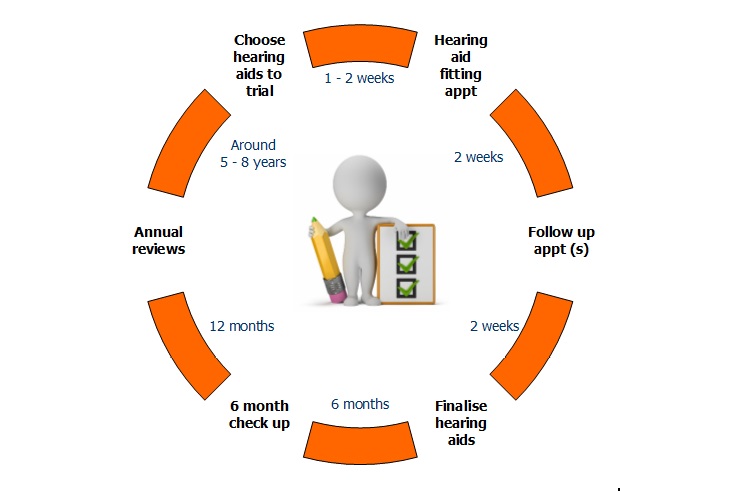
Diagram showing the process and approximate time periods for the life cycle of a pair of hearing aids
Step 2: Hearing Assessment & Discussion
Hearing loss can be:
A full hearing test will clarify your hearing levels and help identify possible causes of your hearing loss.
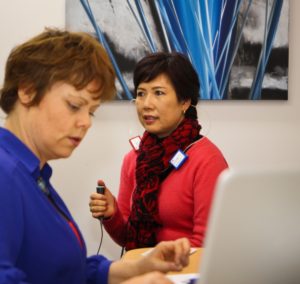
- conductive – where the sound is blocked from reaching the cochlear (outer or middle ear)
- sensorineural – where the cochlear is not able to detect all the sounds
- an auditory processing disorder (APD) – where the brain cannot process the sound detected by your ears detects.
Your Audiologist will discuss your test results. If there is hearing loss, we will let you know why it is affecting your ability to understand people speaking, even though you can hear some sounds easily. At this point, we will refer you on to any other professionals, for further assessment or management, if needed.
If you are interested, we will tell you a bit about hearing aids and possible options that might suit you. You can even have a listen through some hearing aids.
Needs Assessment
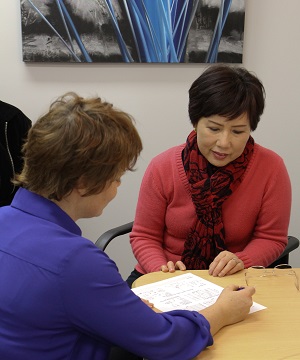
Once you have decided to learn more about hearing aids, we will go through your needs assessment process. We will ask you questions about your lifestyle and hearing challenges. From here we can decide on the hearing aid features and level of technology that suits you best. At this point we create a list of situations where you would like to hear and communicate better. When choosing hearing aids for you we take into account your:
- Hearing loss and other physical factors
- Lifestyle and your hearing needs
- Preferences i.e. what the hearing aid will look like or specific functionality
- Funding and budget – you may be eligible for funding from a government agency
Hearing aids are fitted on a 60-day trial
Once you have decided to trial hearing aids, the process takes 4 – 6 weeks. The 60-day trial system allows you to be sure you are hearing well with your new hearing aids and they are meeting your hearing needs. Depending on your type and degree of hearing loss it takes a few days to a few weeks to adjust to the new sound, so 60 days is plenty of time for you to get used to your new hearing aids.
Hearing aids are always paid for in full before taking them home. If you decide that hearing aids are not for you, you can hand them back within the 60-day time frame. If you do, you will be refunded the cost of the aids minus the fitting fee (to cover some of the time spent with you). We also have the option of changing to other hearing aids at this time if needed.
Hearing Aid Fitting Appointment
Our main goal at the fitting is to get you comfortable with the sound and management of your new hearing aids. We will:
- Calculate the sound required and program your hearing aids specifically for your hearing loss.
- Do real ear measures – use a small soft microphone to measure the sound in your ear canal. This verifies that the hearing aids are doing what we expect of them.
- Discuss the management of hearing aids, cleaning, using the phone
- Talk to you about adjusting to sound and wearing the hearing aids as much as you can.
- Book the follow up appointment – in 1 or 2 weeks time.
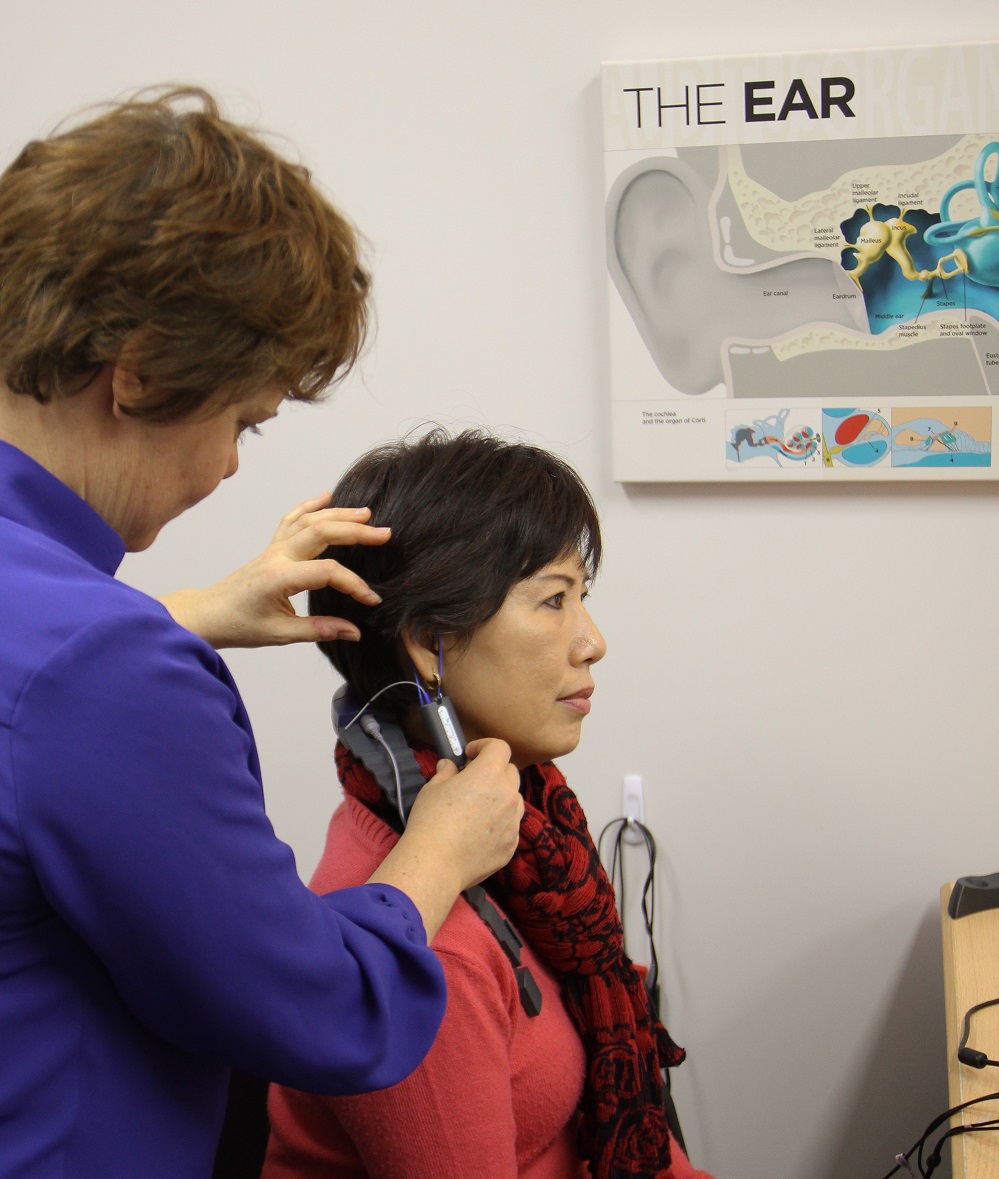
Follow up appointments
Follow up appointments allow us to check how you are going with the hearing aids and make adjustments, as required. Usually people have got used to the initial settings of the hearing aids and are ready for a clearer sound. The number of follow up appointments required will vary for different clients.
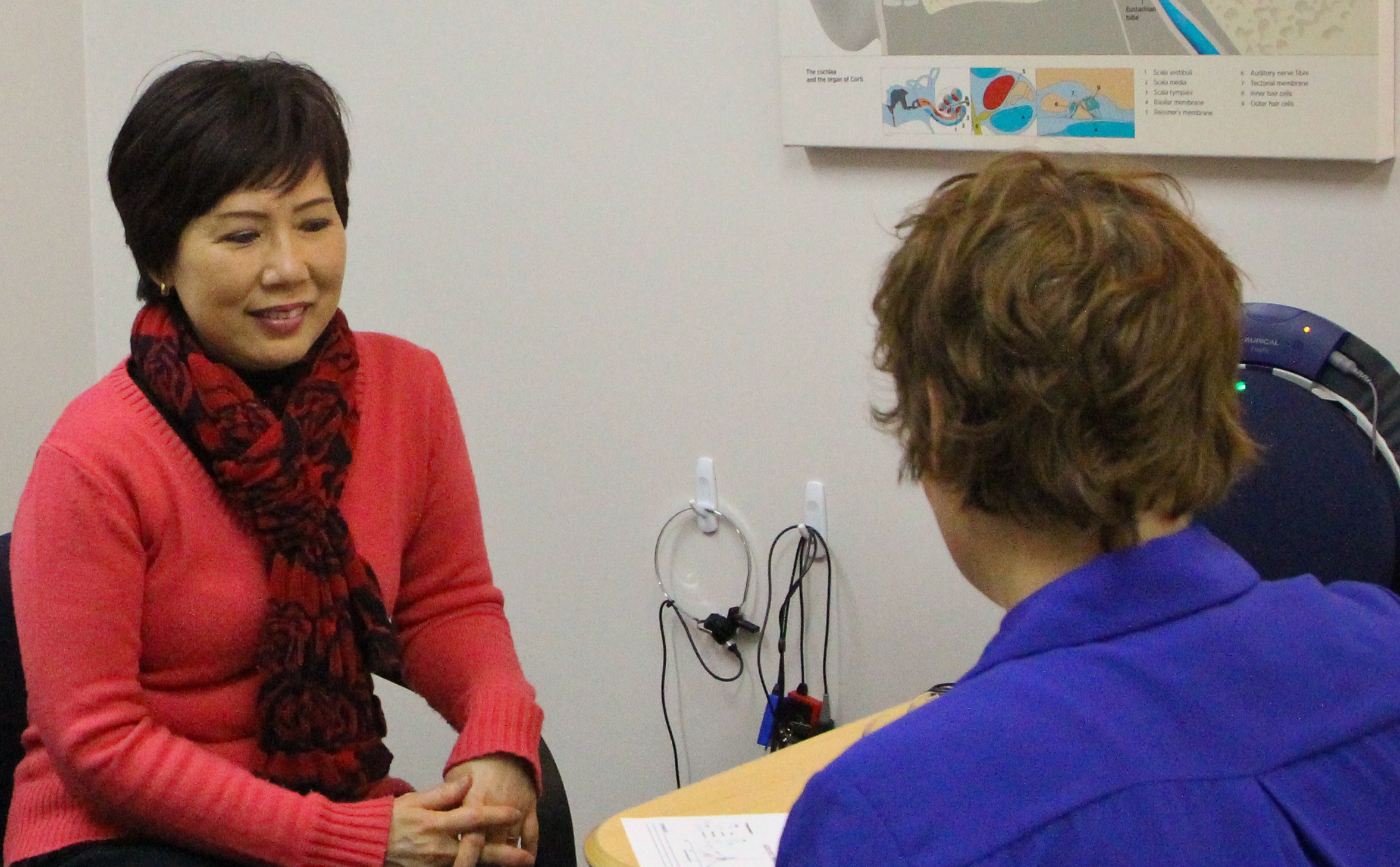
Finalising means that you are happy with your hearing aids and have decided you want to keep them. We will not schedule another appointment at this time but you are welcome to contact us again if you have further questions or need adjustments to your hearing aids. All appointments until your 6 month check are included.
6 Month Check
We will call you up in six months for a check up. This appointment and any appointments up until this time are included in the initial fitting fees. We will check how you are going with your hearing aids and can make adjustments or modification if needed.
Annual Review
You will be called up each year for your annual review, which will include a hearing assessment and adjustment of your hearing aids. We will also check your hearing aids over and make sure they are working as they should.
It is worth coming along to these appointments each year as often hearing gradually continues to change. When we refit your hearing aids to your up to date hearing test your hearing aids will sound clear and crisp again. You will notice the clarity difference especially in difficult listening environments like in groups or noise.
Maree contacted me recently and I went in for another check where she gave my hearing aids a tune-up to maintain their efficiency. With my slowly deteriorating hearing, I hadn’t noticed I wasn’t hearing as clearly as before. I was surprised at how much more I could hear once my hearing aids were adjusted.
Excellent service indeed!
Max Ross- Auckland CBD

Replacing your hearing aids
Traditionally hearing aids lasted about 4-5 years as they would be affected by wax, moisture, dust and dirt. Now most hearing aids are covered by high tech coatings that make them much more resistant to moisture.
Hearing aid lifetime – It is not possible to tell how long these current aids will last but with good care possibly 6-8 years. Obviously, you will need regular hearing assessments and adjustments over that time to keep them working the best for you.
Insurance – It is important that you have your hearing aids listed on your insurance policy just in case they do fall into water or get crushed or lost.
Hopefully, you are feeling clearer about the hearing aid fitting process now. As an Auckland Hearing client, you will become part of our Auckland Hearing community. As long as you are interested we will keep you up to date about the hearing world from hearing care to the latest hearing aids.
Please feel free to add any questions or comments in the section below. Or browse among the other articles about hearing loss and hearing aids.
The post Getting Hearing Aids – What is the Process? appeared first on Auckland Hearing.
]]>The post Directory: List of Ear Nurses for Ear Wax Removal appeared first on Auckland Hearing.
]]>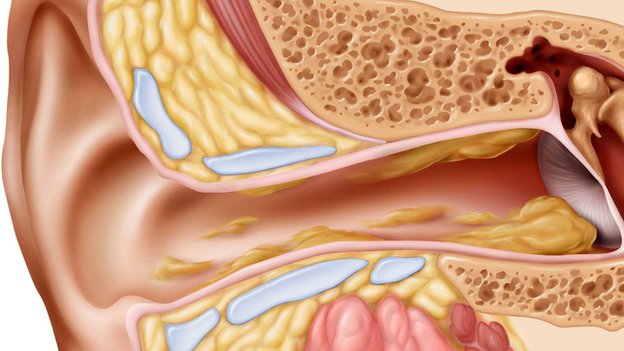
Sometimes wax accumulates in the ear canal. This needs to be removed before a hearing assessment. An ear nurse is the best professional to see for this. An ear nurse is the best professional to do this.
Note: We do not do wax removal by suction at Auckland Hearing, we are an Audiology clinic – this list is for your information.
Please scroll down to find the details for your closest Ear Nurse Specialist and contact them directly.
At Auckland Hearing, we provide audiological services like hearing tests and fitting hearing aids. You must see an ear nurse specialist who will remove wax from your ears. At this stage, we do not have an ear nurse working from our Auckland Hearing rooms.
 Before testing your hearing at Auckland Hearing we will look in your ears to check your ear canals and eardrums are healthy and free of wax. If your ears are blocked with wax we need to organise to have it removed before beginning the hearing test.
Before testing your hearing at Auckland Hearing we will look in your ears to check your ear canals and eardrums are healthy and free of wax. If your ears are blocked with wax we need to organise to have it removed before beginning the hearing test.
When your ears are blocked with wax it will affect the hearing test results, as we are trying to find out the very
quietest sounds you can hear. If they are only partially blocked (and the wax is deep in your ear canal) we may still ask you to have it removed. This is because we use insert earphones to test your hearing and would not like to push wax further down your ear canal towards your eardrum.
If you have hearing aids or are thinking about getting them, a partial wax blockage is also likely to affect the way they work (possibly causing acoustic feedback or reducing the available sound ).
If you need wax removed, we recommend you see an ear nurse.
Why do I get wax in my ear?
Our ear canals have specialized cells that produce cerumen, commonly known as ear wax. Ear wax is our natural ear cleaner, it also lubricates our ears and has an antibacterial function.
How does ear wax clean our ears?
The skin on our bodies is replaced and regenerated constantly. For most of our bodies, the old skin comes off on our clothes or when we dry ourselves with a towel. We do not usually have contact with the skin in our ear canals so it is the job or the ear wax to escort the old skin cells out and away.
 The skin in your ear canal naturally grows in an outward, spiral pattern. Your natural jaw movement like talking and chewing keep the process moving. Dead skin cells stick to the wax and they migrate slowly and constantly from deep in our ear canal – near the eardrum – to the entrance of the ear. For most people ear wax clears by itself with a normal face and hair washing.
The skin in your ear canal naturally grows in an outward, spiral pattern. Your natural jaw movement like talking and chewing keep the process moving. Dead skin cells stick to the wax and they migrate slowly and constantly from deep in our ear canal – near the eardrum – to the entrance of the ear. For most people ear wax clears by itself with a normal face and hair washing.
Then why do I have wax in my ears?
Some people have ear wax accumulation over time; they may have a narrow or bendy ear canal or their natural wax system may not be working so well (perhaps from using cotton buds in their ears). Also sometimes using hearing aids or earplugs may cause wax build up as the ear canal is blocked and the wax cannot migrate out all the way. An ear nurse specialist is the best professional to see if you need wax removed.
Getting it out…
People are often tempted to use cotton buds or other items to clear their ears. This can push the wax further down the canal, further impacting the wax or may even push it onto the eardrum – which is very uncomfortable. It is also possible to puncture the eardrum, which is very painful and can have long-lasting effects.
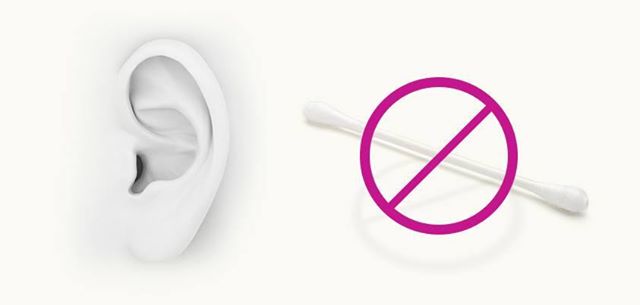
Why should I see an ear nurse specialist?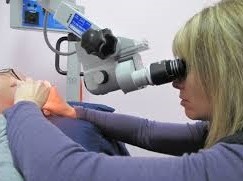
An ear nurse will offer you safe removal of ear wax or other debris blocking the ear canal using a microscope and gentle micro-suction. Suctioning is less traumatic than syringing and has a lower risk of infection. Ear nurse specialists are trained in ear health.
What if I get the wax out and I still can’t hear well?
A wax blockage can cause hearing loss because it can act as an earplug and stop sound passing through your ear canal to your eardrum. Sometimes taking the wax out, can help you to hear better. However, if there is a gap through to the eardrum sound will be passing through normally. Please contact us at Auckland Hearing if you are still not hearing well enough after that wax has been taken out. We will do a hearing assessment, and we can let you know what to do next.
Ear nurse directory
Central Auckland
Lesley Tuck
155 Remuera Rd, Remuera
Adults $50 ACC & War Veterans – no surcharge
Wednesday afternoon and all day Thursdays
Ph: 09 529-5550 mb 0273 500 004
East and South Auckland
Debby Sandow
50 O’Halloran Road Howick 2014
Home visits available in Howick or Pakuranga
Debby can see children
Fee: $45.00
ACC & War Veterans – no surcharge
Ph 0274 427040
Carol Lazarus – Ear Nurse Specialist
Takanini – Mondays
26 Balgowan Terrace, Conifer Grove
Pakuranga/ Takanini – alt. Fridays 10 am to 4 pm
170 King Street / 26 Balgowan Terrace, Conifer Grove
Ph: 0800 111 565 or Mb 021 1658 556
South Auckland Ears – Ian Fitzgerald
Counties Medical building, 6 O’Shannessey Street
Tuesday, Wednesday and Friday evenings: 4 pm until 7.20pm
Saturday: 8.20 to 1.20pm
Fees: $50.00 adults, $45.00 seniors, $35.00 children.
Phone or text Ian on 021 540 535
North and West
Nurse Specialist Ear Clinic – Margaret Couillault
Health – I Care Medical Centre Building,
215 Wairau Road, Wairau Valley
Ph: 09 634 0893
Book online
Tuesday, Wednesday & Thursday
Professional Ear care – Barbara Middleton and Kahn Bury
Westcare Specialist Centre, 1 Moselle Avenue or off 131 Lincoln Road, HendersonClinic days:
Tuesdays 9 am to 4 pm with Barbara Vail Middleton CNS Otology
Fridays from 8.30 am to 4 pm with Kahn Bury, Ear Nurse Specialist.
Fees: First Visit – $55.00; Gold card holders – $50.00; Follow up – $50.00; Examination only – $45; Tertiary Students – $40.00; Children – $40; War Pension and ACC Hearing Aid clients are free as the costs are claimed through those departments or Associations; IHC Clients & special Olympians are free
Ph: 09 834 4446
Auckland Wide
Carol Lazarus – Ear Nurse Specialist
Please call for an appointment
Ph: 0800 111 565 or Mb 021 1658 556
Mon: Pukekohe/Takanini
Tues: Henderson/Henderson
Wed: Papakura/Takanini
Thurs: Manukau/Takanini
Fri: Pakuranga/Howick
These are alternating weeks, 9am-4:30pm
Auckland DHB Ear Clinics- (Children ONLY)
The ear nurse service is available (and free) to all children living in the Auckland District Health Board area. The area is bordered by Point Chevalier, Avondale, Blockhouse Bay, Otahuhu, Mt Wellington, Glen Innes, The Eastern Bays and The Gulf Islands.
There are two options to access this service.
- Ear Clinic Greenlane Clinical Centre (9am to 2:30pm)
- Mobile Ear Clinic – which visits some schools in the area.

Services provided by Mobile Ear Clinics are:
- Glue ear assessment and management
- Wax/foreign-body removal
- Grommets checks
- Treatment of discharging ear(s)
- NB: NO hearing tests are performed in the Mobile Ear Clinic.
To make an appointment:
Who Can Refer: General Practitioners, medical or educational personnel, parents/caregivers.
- Call: please phone Starship community (09) 639 0200
- Non-urgent: written referral to Central Referral Centre, Building 10, Ground Floor, Greenlane Clinical Centre
- Acute referral e.g. chronic suppurating otitis media: fax referral toAudiology, Greenlane Clinical Centre at (09) 630 9751

“Do I need hearing aids?”
Well… “Do you need hearing aids?” Hearing loss is common Many people wear hearing aids Have you noticed them? Hearing aids have changed significantly over the last few years and continue to change at a great rate. Like phones, computers… READ MORE
- Ear wax removal – Auckland Ear Nurses
- Quiet new hearing clinic
- Hearing aids – Your decision
- Getting Hearing Aids – The Process
The post Directory: List of Ear Nurses for Ear Wax Removal appeared first on Auckland Hearing.
]]>The post Do I need hearing aids? What is the right solution for me? appeared first on Auckland Hearing.
]]>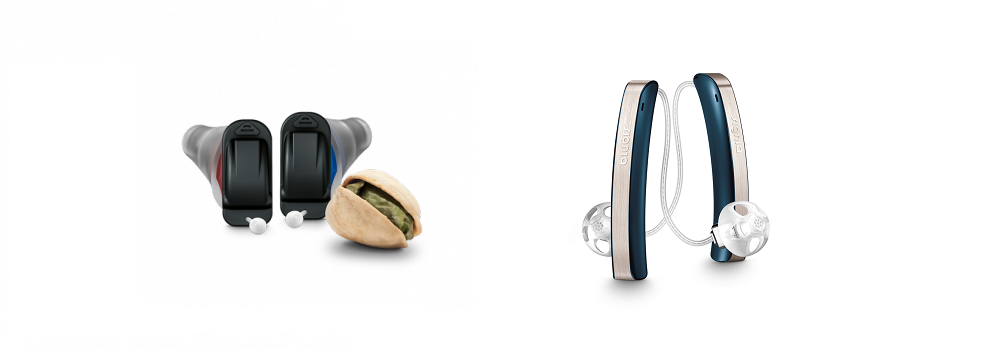
Well… “Do you need hearing aids?”
Hearing loss is common
Many people wear hearing aids
Have you noticed them?
Hearing aids have changed significantly over the last few years and continue to improve at a brisk rate. Like phones, computers and tablets, hearing aids are mini computers that are processing more and more information. Every year or two each of the larger manufacturers brings out new and improved products.
Manufacturers often release the higher end products first, then gradually they release the mid-range and value products. The advantage of this is that there are excellent hearing aids in every technology range and they are continually improving. What great news this is for people with hearing loss, because hearing aids are not only effective at helping you communicate understand conversation in your everyday life, they look good too!

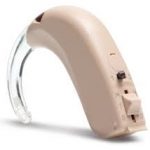
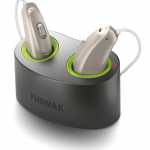
How will hearing aids help me?
Simply- Hearing aids provide audibility for the sounds that have been missing
Hearing the sentence correctly the first time means that you will (most likely)* say goodbye to:
- Auditory fatigue (less mental gymnastics to work out what was said).
- Having to ask for repeats.
- Embarrassment from getting something wrong.
After wearing hearing aids for a while, you will notice you are more relaxed and confident in social situations and general conversation:
- More confidence – in yourself as you are sure you are responding correctly
- More interest – in being involved in social events, as you are confident to join in
- More relaxed – as you will no longer need to be on hyper-alert; you know you will hear things around you – like the doorbell, the phone ring or people walking up from behind
*Most likely – because this is hearing loss dependent. People with severe/profound hearing losses or very poor speech discrimination may not receive all of these improvements. If we think this may affect you, will discuss it in detail before choosing hearing aids. The most significant changes happen for people who wear their hearing aids all the time.
Detect sound with your ears
Our ears are designed with collect sound from the environment and amplify it to a level where it can be delivered, via nerves, to the hearing centre in our brain (auditory cortex). The brain uses the electrical signal to recognise sound from the environment and understand speech.
Hearing loss means the ears are damaged in some way. In most cases, just increasing the volume of the sound to our ears is not helpful to improve hearing clarity.
Hearing aids are small computers that often work together to optimise the signal received by the brain. They are constantly measuring the sound environment and adjusting the way they amplify to optimise hearing comfort and speech understanding and to reduce listening effort.
Higher level hearing aids have more automatic features to modify the sound to help you hear easier and with less effort.
Hear with your brain
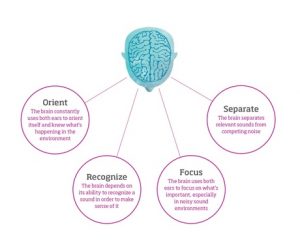
Use it or lose it
Wearing hearing aids more strengthens the auditory system by giving it more practice with listening to various sounds and helping it relearn/learn which sounds are important and which sounds are not.
The ability to understand speech, especially in noisy environments usually improves with increased wearing time.
Regular hearing aid use will help your brain “hear better”
Interpreting sound information requires regular exposure. People who wear their hearing aids “only sometimes” are giving their brain two signals, hearing and not hearing, some sounds.
Their brain does not have as much practice interpreting the sound information and will not be able to use the information so well.
The ability to understand speech reduces over time – especially with a significant hearing loss
When there is hearing loss, the brain is not receiving the signal for all the sounds in the area of hearing loss. As this continues for many years, the brain does not have practice using the sound message and becomes less capable of managing the auditory information. It may even relocate those brain resources to another function (typically the visual system). The sooner you get hearing aids, the sooner you are providing your hearing system with sound and keeping it active.
“I notice an improvement in my client’s ability to repeat back single words, in quiet, with regular hearing aid use.
This effect is most potent for people with more severe hearing losses, who have waited a long time to get hearing aids.
Maree O’Sullivan (Audiologist)
A bit about Hearing Aids
Hearing aids have a lot of technology innovations working together to bring about the outcome of “simply” hearing. Below is a brief description for some of this functionality. There are 9 hearing aid brands that are approved by the Ministry of Health in New Zealand. Each brand has “speciality features” and often they use different terms for some of these:
Programmed for you
All hearing aids (supplied by a qualified professional) are programmed and then fine-tuned specifically for you. Your hearing test (Audiogram) is used to calculate the right amount of sound specifically for your hearing levels.
Adjust to your listening environment
Hearing aids do not amplify all sounds equally, they amplify quiet sounds more than loud sounds; this allows as many sounds as possible to be both audible and comfortable. Hearing aids are not just a volume control.
Directional microphones
Directional
Feedback cancellation
Feedback cancellation makes sure that the hearing aids do not feedback (make a loud high-frequency sound). This can happen if the sound from the “loud-speaker” reaches the microphone.
Noise reduction
Noise reduction is a feature in most hearing aids, the way it works varies between brands. Most hearing aids are able to focus more on speech sounds and reduce the loudness
Physical comfort
Current technology hearing aids are light and comfortable in your ears.
Cosmetics
Hearing aids no longer look like a medical device. Now they are a piece of technology like a computer or
Hearing aids style
Below are examples of the receiver in the canal type technology for some of the brands. There are many other styles of hearing aid as well. The choice of style will depend on preference and degree of hearing loss.
Connectivity
Hearing aids can connect to other devices like a phone, TV or remote microphone to take the sound from these devices directly to your hearing aids.
There are many other hearing aid features available from various suppliers, for example waterproof hearing aids, personalisation, stereo sound and more.
Current hearing aids look like this
Here are examples of the receiver in the canal type technology from some of the brands. As you can see, the terminology used to describe this style varies between manufacturers.
The picture below shows the different styles of hearing aids that are available. The choice of style will depend on your preference and degree of hearing loss.
-
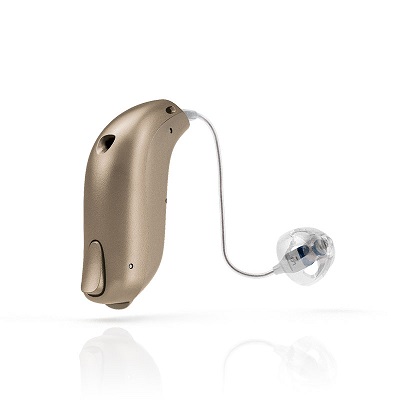
Bernafon Zerena hearing aids -
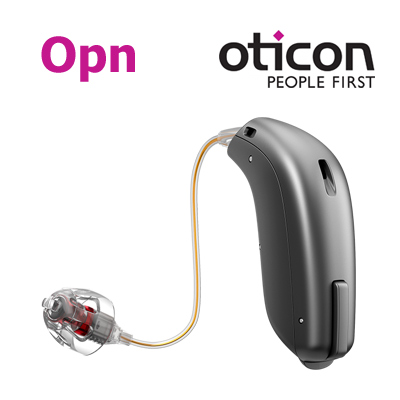
Oticon opn -
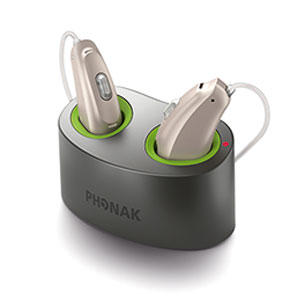
Phonak rechargable hearing aids -
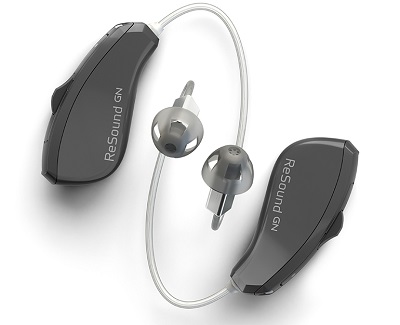
ReSound linx quattro hearing aids -
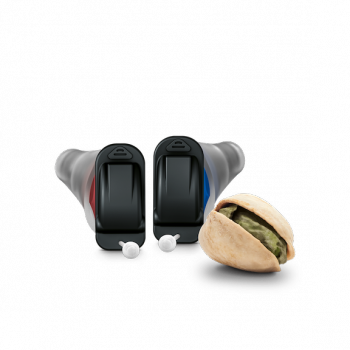
Signia Silk Nx hearing aids -
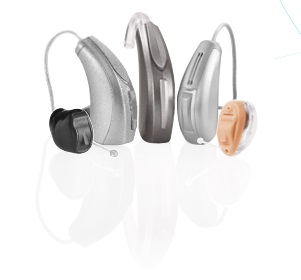
Starkey Muse IQ -
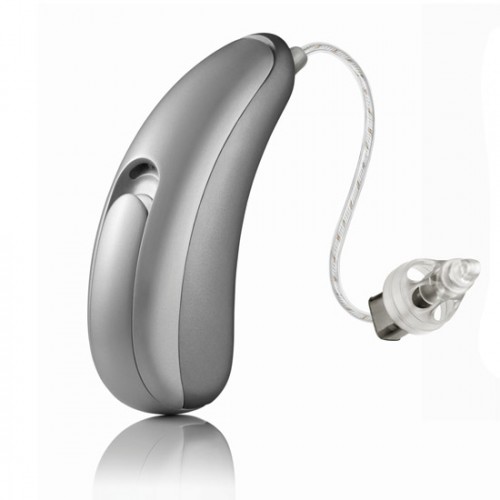
Unitron Moxi Kiss -
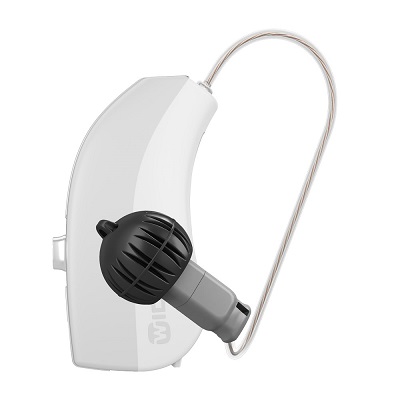
Widex evoke hearing aids
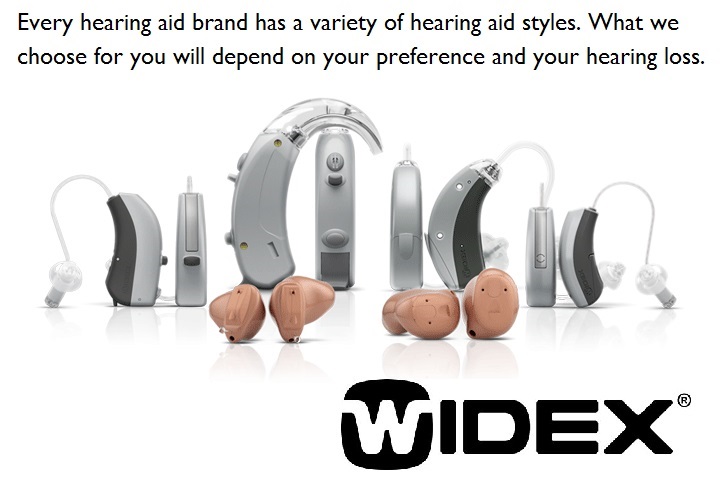
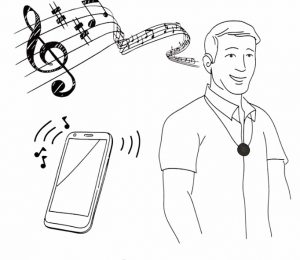
There are many technologies available now that connect up with your hearing aids. They connect to your phone
(land line or mobile), TV, computer, MP3 player and stereo. You can also get remote microphone technology, where you can give the speaker a microphone or place it on the other end of the table, then hear the conversation directly into your hearing aids.
Watch this video for example of how technology can work with hearing aids.
What is the right solution for me?
Once you have decided to improve your hearing, we will look in depth at your lifestyle and listening needs to make sure we get the best solution for you. The best solution for you may not be hearing aids. We will let you know all the options then you can choose what you think will work best. We will ask you questions about your lifestyle and listening needs, then match the best technology (or other option) for your situation. Learn more about the process of getting hearing aids here.
Have you made the decision to try hearing aids?
A bit about Auckland Hearing

(Audiologist at Auckland Hearing)
Auckland Hearing is an independent hearing aid and audiology clinic set up by Maree O’Sullivan. Maree has worked in Audiology for 20 years and started Auckland Hearing so she could focus on the needs of each client (rather than corporate profits).
We provide a full range of hearing services and work with all of the Ministry of Health approved hearing aid brands in New Zealand. This means we can fit the hearing aids that best suit your needs.
Hearing aids – Your decision
Are you ready to get hearing aids?
Your family might think you need hearing aids
Your audiogram (hearing test) might suggest hearing aids would help you
But are you ready to get hearing aids – for yourself?
Every process begins with a decision. The key to success with hearing aids is: that you have decided for yourself that you are…

The post Do I need hearing aids? What is the right solution for me? appeared first on Auckland Hearing.
]]>